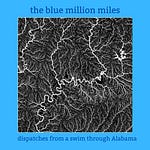*clears throat*
It’s always easier not to. Not to write. Not to swim. Not to write about swimming. Easier not to turn left off the state road and descend the mountain to the lake below. It’s not like anyone will ever force you to. The excuses offer themselves too easily. And besides, entropy doesn’t even ask for one, content to carry you down its current, you low-down lazy bum.
But here I am. I’ve done it. I’ve come to the water’s edge. Lake Chinnabee. My trunks on. My shirt off. And…my only thought is of turning around. It is March. It is windy. And it is always easier not to. Even at the water’s edge.
Chinnabee is a small lake. 17 acres, if that means anything to you. You could achieve the opposite bank in a few minutes’ swim. Quaint. “A pastoral valley of peacefulness” is how the forest service describes it. Sure.
It’s smack in the middle of the Talladega National Forest. This is northeast Alabama. The mountains (insofar as that means anything here). The foothills of Appalachia, anyway. That famous trail officially ends 300 miles to the east at Springer Mountain, Georgia. But technically the range continues, or unravels really, across the border here before laying down on the coastal plain below. There’s a movement to extend the trail to Alabama; AT2AL it’s called. A purist’s vision, I guess, to trace the mountains down to the last peak, Mount Cheaha, which is just a few miles east of here, where I stand on the bank of this lake, the end of the end, the southern terminus, thinking about not swimming.
Then comes another thought. One that is at once stupid and profound. A holy-fool thought, to which I am too often inclined. This one having to do with time, and how we encounter it. How it shapes us. Namely that these mountains are very old and that it is a wondrous, almost inconceivable thing to be upon them.
The geological events that brought about the Appalachian mountains took place hundreds of millions of years ago, and involved great volcanic eruptions, the colliding of continental shelves, the coming together and the coming apart of Pangea. The Appalachians were once contiguous with a range that today stands in Morocco. I’ve just written that, but really I don’t even know what that means. The timespace of these hills, it’s like they’re in some kind of superposition. I’m looking at rock that was once at the center of Pangea, at the center of everything. In a range that is thought to have once been as tall as the Himalayas, the tallest in the world. But time, in this case expressing itself as hundreds of millions of years of erosion and continental drift, has worn it down and spanned an ocean through it.
I’d given a reading the night before, which is why I was up in this corner of the state. I’d published a book a few years ago about Confederate monuments and the protest movements to remove them. It had came out in September of 2020, which you might remember as a time of global viral pandemic. So the book tour was virtual. And though I was lucky enough to do a good number of events discussing and promoting the book, they all took place on Zoom. So this reading in March was the first I’d done in person.
The writer John Jeremiah Sullivan talks about reading old writing as a kind of vaudeville, an impersonation of yourself. And for me this was doubly so. The book was written years ago now and chronicles events and experiences that took place in the years before that, and what’s more it renders a version of me that is even younger and more naive. I had wanted to trace an intellectual and moral development that took place over the past decade or so on questions of race and equity and how we face the past. And so reading it that night, as good as it felt to read in public and in person, it also felt tired, and a bit uncanny. I didn’t quite recognize myself. Was it me? It was not not me, but also not quite me. Not anymore, anyway. I’d written those words and had those experiences, sure but they’d been so worked over, they’d taken on a worn smoothness. The geological events that led to that book were now so far in the past, the eruptions and subductions worn down through time and repetition. My reading copy of the book dogeared, yellow, exhausted.
That project felt finally done. Funny to think that the first proper reading of this book might well also be the last. Point is, I woke this morning with a renewed if belated exuberance to swim and to write and to write about swimming and to turn left off the state road and descend the mountain to the lake below - easier though it may be have been not to.
By now I’ve dallied long enough for the sun to get up over the treeline and the wind has tapered off but Jesus it is cold. I am still thinking of not swimming even as I plunge. I surface, turn, float on my back and regard the great dome of the sky.
There’s a box turtle on a fallen log up by the marshy banks where a stream feeds the lake. The turtle’s neck is fully extended, as if on a string drawn to the sun above.
I feel compelled to nod to the turtle, who acknowledges by presence not at all, and I go back to floating.
Whence come the mountains? Whence come the ideas? It occurs to me that this sense of exhaustion I’m feeling can only be cast off by exhausting myself anew. It’s easier not to. But also, of course, worse. I swim to the shore and stand in the sun, drip-drying.
That’s when another stupid-profound thought hits me: Sure, this is the southern terminus, the end of the end of the trail, but I need only to turn around and there I’d be at the start once more.
I head north up a trail that traces the lake’s feeder stream until, after a mile or so, I come to a waterfall. And there for a time I stand beneath it, letting all that water come down upon me.









